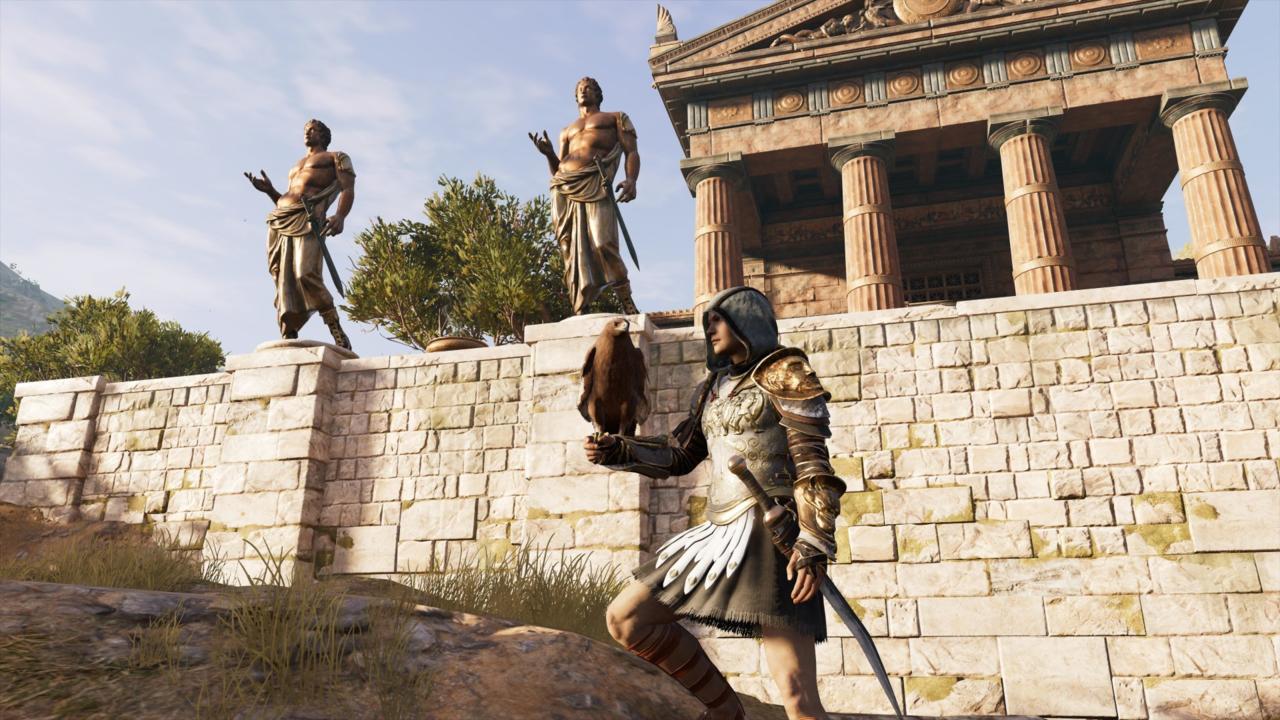GAMES REVIEWS
Assassin’s Creed Odyssey Review – Mighty Adventure
Published
6 years agoon
By

In your trek through the Greek mainland and the islands of the Mediterranean sea, you come across diverse locales that showcase lush environments that pay tribute to the old gods, while rubbing shoulders with the many historical figures of the era looking to make their impression in Greek society. The amount of detail packed into each location is impressive, tied together by an active and dynamic ecosystem where local wildlife and civilians keep their territory. But as you dive further, you’ll see the many hardships and realities of life in Ancient Greece firsthand, including the horrors of slavery and the ever-present war between the military-driven Spartans and the bureaucratic Athenian army.
Featuring a map that’s more than double the size of the previous game, Odyssey is built to be explored and has incidental content to reward your wanderlust. You get the sense that your actions will have a lasting impact wherever you go, and Odyssey offers up a wealth of content that fuels your growth at a steady pace. Though the issue of level-gating comes up occasionally, preventing you from actively exploring any region as you wish, you can take a break from the main story and dive into the breadth of side content at your leisure. Several side quests offer a surprising amount of depth and heart and feature some of Odyssey’s more standout moments.
Throughout the main story and in side-quests, you’ll make several key decisions that affect the game’s narrative and your character’s journey. While many of the choices you make are largely inconsequential and result only in slightly different endings for quests, the fateful decisions that do matter can lead to drastic turns of events, with some storylines and characters meeting their end prematurely. In moments you’d least expect, you’ll see the payoff for decisions made early on in the story, for better or worse. With nine different possible outcomes at the main story’s conclusion, there’s a surprisingly large amount of cause and effect that can make the narrative feel all your own.
The different protagonists also offer up some of Odyssey’s most endearing and entertaining moments. Despite the grim nature of the game, jokes and fun gags often break the tension, even during serious events. Though both Kassandra and Alexios share the same dialogue and story beats, their differing personalities, gender, and points of view offer unique flavor, making them stand apart–with some scenes and questlines feeling more appropriate with a particular character.

Romancing side characters is also possible in Odyssey. While some of these scenes can be amusing, they’re mostly just bizarre shows of affection that have no real purpose. These scenes almost always result in a shallow aside during the conversation, with the characters slinking off-screen before returning to the conversation without skipping a beat. Most often, these awkward romance opportunities appear immediately after (or during) otherwise harrowing events. Aside from seeing some additional scenes with certain characters, there’s really no benefit to engaging in romance at all. The inclusion of these scenes feels cheap and can sully otherwise interesting conversations.
As you unravel more of the world and advance in the main story, new gameplay mechanics and side opportunities will reveal themselves, adding even greater incentive to explore. When the conspiracy that threatens Greece makes itself known, you’ll be able to keep track of the major players through a large interconnected web in the game’s menu, showing their connections to other targets and how to find the intel to track them down. But in one of Odyssey’s more involved quests, you’ll encounter several mythological beasts hidden within the world, offering up some of the game’s most inventive and memorable encounters, where brute force isn’t always the answer.
The world in Ancient Greece feels much more reactive compared to previous Assassin’s Creed games, and you get the sense that your actions will have a lasting impact wherever you go. When you start causing too much trouble, you’ll attract the attention of rival mercenaries looking to collect a bounty. Similar to Shadow of War‘s Nemesis system, though not as sophisticated, Odyssey presents a seemingly endless set of antagonists with their own backstories, strengths, and potential loot. If you find yourself with a bounty on your head, mercenaries are often quick to appear–leading to some annoying encounters where they arrive at the worst possible time, even during some story missions. If the heat from the encroaching mercenaries feels too much, you can lay low long enough for the bounty to clear, assassinate another wanted criminal, or pay off your own bounty in the game menu.
With nine different possible outcomes at the main story’s conclusion, there’s a surprisingly large amount of cause and effect that can make the narrative feel all your own.
One of Odyssey’s more clever features is the new Exploration Mode. With this optional mode enabled, you’re challenged to use your observation and deduction skills to find your next target, without the support of icons or waypoints. By engaging with quest-givers and friendly NPCs, you’ll learn details about your surroundings and slowly piece together your next steps. Exploration Mode heightens the pride that comes from solving puzzles, and this makes each step of your investigations feel all the more rewarding.
When it comes to combat, Odyssey keeps up with the recent trend to incorporate stat-based mechanics into its core gameplay. Compared to previous games, there’s now a greater focus on allowing you to customize your character to approach the challenges ahead. You can also build your character to specialize in stealth, long-range, or melee combat, and you’re able to respec at any time. If you want to build your character as a powerful Spartan warrior wielding a legendary spear and use your Spartan Kick to boot enemies off cliffs, you can, but you are also free to stick with the traditional Assassin archetype.
This opens a lot of opportunities to experiment with special moves and gear, the latter of which can also be customized with special perks that offer unique bonuses. Odyssey no longer features the shields introduced in Origins, and as a result, combat flows at a brisker pace. By placing the emphasis more on dodging and parrying incoming blows from enemies, fighting feels more involved and dynamic. While there are times where Odyssey can run right into the awkwardness of its RPG mechanics clashing with the action gameplay–such as being unable to assassinate enemies outright due to being under-leveled–it makes up for it by giving players the options to avoid such clumsy engagements.

Naval combat and sailing make a return in Odyssey, opening up exploration on the high seas. As you build up resources and find new members to join your crew, you can customize and upgrade your ship, The Adrestia, to take on more daring challenges. Much like in Black Flag and Rogue, seafaring offers up some of the more exciting and visually pleasing moments of the game, finding lost sunken ruins in the oceans depths or facing off against increasingly aggressive rival ships. Over the course of your travels, you’ll be able to recruit new lieutenants to add buffs to your ship, giving you more of a fighting chance against the sea’s greater threats.
The scope of Odyssey is enormous, and for the most part, it’s presented well. But some of the new innovations that seek to fit within the scale of the world, however, feel somewhat lost in the grand scheme of the game. With the ongoing war between the Spartan and Athenian army, you can choose to take part in the conflict and dismantle a faction’s influence in a region. In these Conquest battles, you’ll pick a side and cripple an army’s hold by assassinating their leaders and taking their resources–culminating in a large-scale battle against their forces.
While this is a solid way of gaining resources and improving your standing with a faction, the mechanics and implementation into Odyssey’s general systems make it feel half-baked at best and pointless at worst. In some of the more bizarre cases, the game and its narrative don’t seem to take Conquest seriously, especially when the main story has you helping a particular faction, despite the side content in the area actively hurting them. This in turn can create a jarring and noticeable feeling of dissonance throughout your adventures. The game often struggles to make sense of the actual war gameplay within the context of its core narrative, which is disappointing.











When looking at Odyssey in the bigger picture, it can often feel like too much game for its own good. There are numerous moments where the loop of exploring, completing missions, and traveling can slow the pace significantly. This is exacerbated by the expansive map, which can sometimes feel excessively big and a chore to travel through. There are also some notable bugs and hitches that crop up throughout, including those that prevent progress in missions to outright crash the game. Several times throughout my journey, progression was somewhat exhausting, which made some of the more impactful and exciting moments in the story feel like a drag.
Despite this, Assassin’s Creed Odyssey’s ambition is admirable, which is reflected in its rich attention to detail for the era and its approach to handling the multi-faceted narrative with strong protagonists at the lead. While its large-scale campaign–clocking in at over 50 hours–can occasionally be tiresome, and some features don’t quite make the impact they should, Odyssey makes great strides in its massive and dynamic world, and it’s a joy to venture out and leave your mark on its ever-changing setting.
Source:: Gamespot – Reviews















You must be logged in to post a comment Login